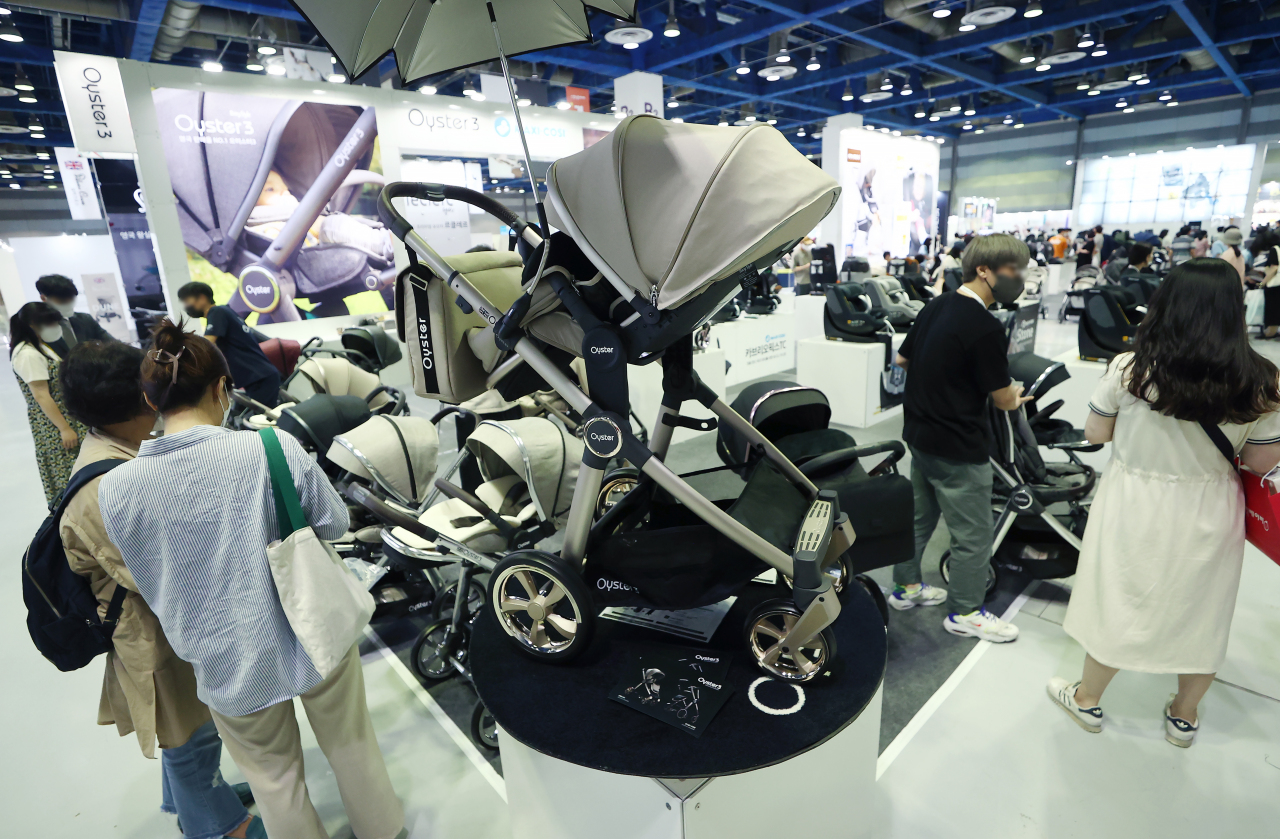 |
Visitors take a look at baby products displayed at a fair held in southern Seoul on June 2. (Yonhap) |
Child care is still heavily dependent on women as they take up a larger share of the work compared to men on both weekdays and weekends, despite the growing belief that both genders should participate equally, a survey showed.
The Korea Institute of Child Care and Education released the results of a survey carried out in May last year on 1,228 parents of toddlers or elementary school students. Some 52.3 percent of the respondents were from dual-income families.
The respondents answered that the share of weekday child care is split into 70.9 percent and 29.1 percent for wives and husbands, respectively. Husbands‘ participation in child care increased on weekends, taking their share up to 42.2 percent. However, women’s share of child care was still higher on the weekends, at 57.8 percent.
There was a gap between partners‘ perceptions of their respective share of child care. When asked what they believed their male partner’s share in child care would be, female respondents answered 24.1 percent, on average. When asked what they thought their share would be, male respondents answered 34 percent.
Though the figures showed women still take more responsibility in child care, both male and female respondents showed a preference for equality in matters of household management, domestic chores and child care.
When asked whether husbands and wives should have an equal say in deciding matters related to the household, respondents of both genders marked 4.1 out of 5 on average in their level of agreement. Respondents showed a low level of agreement when asked whether they think men and women have different roles when it comes to household chores and child care, with an average of 2.2 out of 5.
The institution concluded upon analysis that though the respondents are aware couples need to take part in child care together, women are, in reality, taking up more of the share.
Male respondents showed the highest degree of participation in playing with their children, at 4 out of 5, followed by pickups and drop-offs at 3, helping children study at 3.3, and doing house chores for child care such as prepping meals, doing the laundry and cleaning up at 3.5.
When asked why it is difficult to shape a positive environment for child care, the top answer at 30.1 percent was that partners and families have different approaches to child care. The second most popular answer, at 27.2 percent, was that there is not enough time to spend on child care.
“More fathers are taking part in child care compared to the past,” the survey report said. “There need to be more education programs for fathers to learn more about child care, as they are increasingly likely to take that role.”
“For a positive change in child care culture, there needs to be more time for parents to spend with their children,” the report continued. “The government needs to continue to support flexible working systems introduced amid the COVID-19 pandemic.”
By Im Eun-byel (
silverstar@heraldcorp.com)




![[Herald Interview] 'Trump will use tariffs as first line of defense for American manufacturing'](http://res.heraldm.com/phpwas/restmb_idxmake.php?idx=644&simg=/content/image/2024/11/26/20241126050017_0.jpg)

![[Health and care] Getting cancer young: Why cancer isn’t just an older person’s battle](http://res.heraldm.com/phpwas/restmb_idxmake.php?idx=644&simg=/content/image/2024/11/26/20241126050043_0.jpg)

